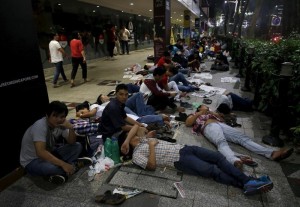Voter Disenfranchisement Rife as Millions Unable to Vote
By Burma Partnership • October 28, 2015 The process of advanced voting in Burma has begun amid much confusion and contradiction. According to The Myanmar Times, election commission officials have offered countering details regarding the timeline of the advanced voting and foreign observers have reported being unaware that the process had even begun.
The process of advanced voting in Burma has begun amid much confusion and contradiction. According to The Myanmar Times, election commission officials have offered countering details regarding the timeline of the advanced voting and foreign observers have reported being unaware that the process had even begun.
Meanwhile, the advance voting process for overseas citizens – which has been ongoing for more than a week – has also been met with criticism. In Singapore, early voters were instructed that only the first 3,000 would be eligible to vote, out of a total of 20,000 who had requested to vote. In addition, embassies in Seoul and Tokyo have reported a high number of complaints relating to bureaucratic obstacles preventing voters from casting their ballots, such as missing ballot papers, late announcements of eligible voters, and missing names on voter lists.
Whether simply inept or intentionally manipulative, the UECs struggle to administer the advance voting process draws worrisome parallels to Burma’s 2010 elections. For instance, a report on the 2010 elections from Burma Campaign UK documented incidents of citizens being coerced into voting for the military-backed Union Solidarity and Development Party (USDP), ballots cast without the knowledge or consent of voters, and the denial of being able to vote in secret for certain voters. Despite the UEC declaring that advance voting would be improved for the 2015 elections, Daw Aung San Suu Kyi has already voiced concern that advance voting could be abused in order to manipulate the results of the election.
Fearing the misuse of their ballots at advanced polls, a group of Burmese workers in Singapore are banding together to launch a “Fly to Vote” campaign to ensure their votes are received on election day. So far, more than 50 individuals have signed up to fly into Burma before the election date and cast a ballot in person.
The UEC has already been criticized heavily in its administration of the electoral process. Voter lists released in two separate occurrences by the commission have been rife with errors; the most notable case being in Rangoon’s Hlaing Tharyar Township, in which more than 200,000 voters were left off of the list. The inability of the UEC to effectively address this issue has pushed the spokesperson for the Civil Society Organizations Forum, Forum for Democracy in Burma and Myanmar Alliance for Transparency and Accountability, which is comprised of 499 member organizations, to state that it is, “violating the right of citizens to vote, which is clearly prescribed in the constitution.”
The advance voting process appears only to further worsen the massive disenfranchisement of voters in the lead up to the 2015 elections. For Burmese citizens living overseas, only 30,000 out of the total four to six million have registered to vote. The Burma Government has already taken away voting rights for most of the religious minority, the Rohingya, and voting rights have still not been granted for Burma’s tens of thousands of internally displaced persons and the 110,000 refugees who live along Thai-Burma border. Meanwhile, there are concerns that voting will be cancelled in many ethnic areas by declaring them unsafe. In total, experts are predicting that nearly 10 million people, or 20% of Burma’s total population, will be unable to cast a vote during the 2015 electoral process.
The credibility of Burma’s 2015 elections is quickly deteriorating and election officials appear to be unable – or simply unwilling – to reverse the downward trend. In order to ensure that the advance voting process is not abused in a manner similar to the 2010 elections, UEC officials must begin prioritizing transparency and accountability. The state of voter disenfranchisement in Burma is nearly out of control and will only seek to devalue the results of the upcoming elections. If these elections are to be truly representative of the interests of the citizens of Burma, the Burma Government and the UEC must reverse the trend of mass disenfranchisement and ensure that voters, whether abroad or in country, are completely accommodated for.
Tags: 2015 Elections, Burma Campaign UK, Burma Partnership, Daw Aung San Suu Kyi, Human Rights, Military Regime, Myanmar’s Union Election Commission (UEC), RohingyaThis post is in: 2015 Burma Elections, Blog
Related PostsArmed Forces and Democratization in Myanmar: Why the U.S. Military Should Engage the Tatmadaw
Burma: Country Reports on Human Rights Practices for 2015
Report of the Special Rapporteur on the situation of human rights in Myanmar
Atrocities Prevention Report: Targeting of and Attacks on Members of Religious Groups in Burma
The 2015 Elections and Beyond: Perspectives from villagers in rural southeast Burma/Myanmar









 All posts
All posts